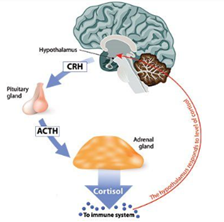Many people are familiar with the effects of trauma on the mind, including the condition known as post-traumatic stress disorder (PTSD). However, it is less common to understand the physical impacts of trauma, which can occur in the short, medium and long term.
What happens to the body following trauma?
One of the key effects of trauma on the body is an increase in the production of the hormone cortisol, which is a normal response to stress. Cortisol works to ensure that various functions, such as the immune system and glucose production, are dialled up and down, depending on what is most needed at the time.

In a crisis, it is important for the body to prioritise glucose production for use in muscles and in the brain, as well as maximising the availability of tissue-repairing substances. After trauma, however, the body can sometimes continue to overproduce (or underproduce) cortisol, which can have significant physical effects over long periods.
What physical symptoms can people experience?
Many people who suffer trauma will experience some degree of physical symptoms initially. These may include agitation, numbness, exhaustion, confusion, pain, sleep disturbance and consequent fatigue. Other symptoms may develop over time, including tinnitus, panic attacks, hearing loss, weight gain, muscle loss and allergies.
Worryingly, sustained cortisol and related hormone imbalance can also have an impact on the blood vessels, which may restrict circulation and increase the risk of heart disease. More information about trauma’s physiological impacts can be found here.
Why is understanding trauma important?
It can be very useful to understand how the experience of trauma can impact people over many years. Ensuring access to first aid at work Gloucester will help to lessen the risk of people experiencing trauma with lasting effects. One solution is to offer robust training courses such as those found at tidaltrainingdirect.co.uk/training-courses/first-aid-at-work/first-aid-at-work-gloucester/.

Trauma can lead to devastating psychological damage, including nightmares, flashbacks, anxiety, depression, emotional detachment and suicide. Understanding that there can also be significant physical effects is helpful when dealing with people who may have experienced past trauma.






+ There are no comments
Add yours